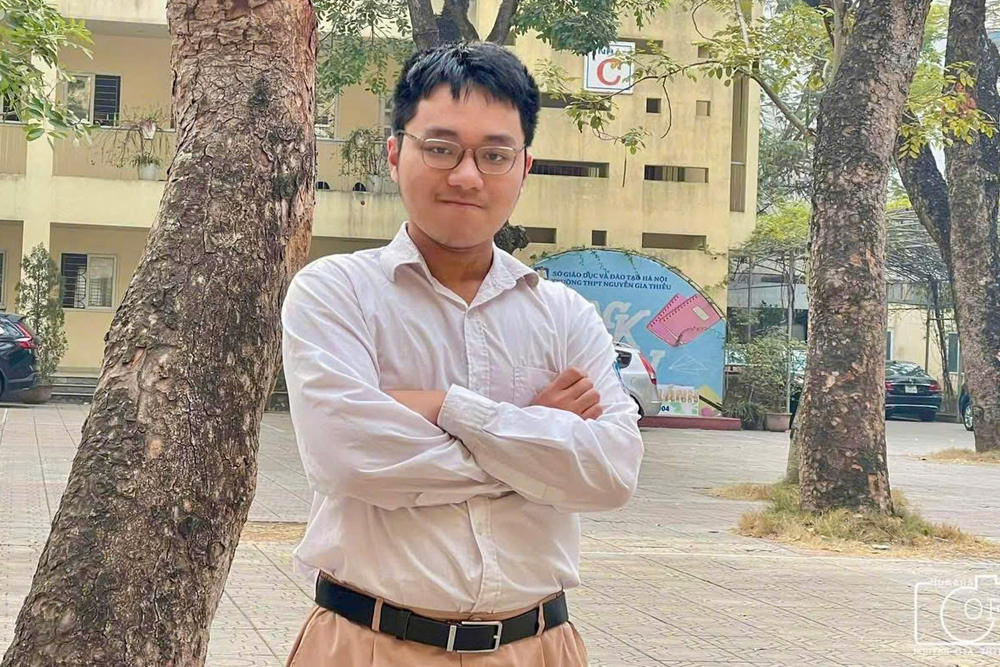Determined to truly learn rather than rely on exam shortcuts, a Hanoi student took the initiative to self-study using free online resources, ultimately achieving an IELTS score of 8.5 and a near-perfect SAT score of 1580 out of 1600.

Luu Viet Bach, a 12th grader at Nguyen Gia Thieu High School in Long Bien District, earned an 8.5 on his first IELTS attempt at the end of last year, scoring a perfect 9 in both reading and listening. He also secured a 1580 on the SAT, with a flawless 800 in Math and 780 in Reading and Writing.
According to the College Board, a score of 1520 placed test-takers in the top 1% worldwide in 2022. Bach had already surpassed this mark in both of his 10th-grade attempts, scoring at least 1500 each time.
“I had a good idea of my score after finishing the test, so I wasn’t too surprised by the result. But I’m really happy to have met my goal,” he said.
Bach first encountered English in third grade through a children’s website and has since relied on self-study, using instructional videos and exercises focused on grammar and vocabulary.
“I don’t like attending extra classes. Self-study allows me to control my own pace,” he said. “I keep practicing until I achieve the highest score possible.”
His exposure to English expanded in middle school when he joined a bilingual program, where frequent interactions with foreign teachers helped him see English as more than just an academic subject – it became a gateway to new knowledge. This realization led him to shift from memorizing grammar rules to applying the language in real-world contexts.

Bach immersed himself in English by listening to news and political programs on NBC, CNN, and BBC, watching comedy shows and documentaries, browsing videos on social media, and reading books and stories. This diverse exposure improved his listening speed, comprehension of long-spoken passages, and ability to structure and develop his writing.
By 10th grade, he had joined various clubs, made friends with native English speakers, and regularly engaged in conversations, texts, and emails with them. He also analyzed English-language stories and sent his writings to friends for feedback. Initially, he practiced with short paragraphs, which gradually evolved into full essays.
“Writing for my foreign friends forced me to learn how to express my ideas clearly. Eventually, writing just became second nature to me,” he shared.
A free online philosophy course from the University of Queensland further refined his writing and analytical skills. As a result, just four days before his IELTS exam, all he needed to do was review a few sample tests to familiarize himself with the format.
“The exam was quite simple,” he said.
Cracking the IELTS and SAT
For the IELTS reading section, Bach pointed out that many test-takers struggle with True/False/Not Given questions due to tricky wording. Although answers may contain similar phrases from the passage, incorrect logical reasoning can lead to mistakes.
Many students rely on skimming and scanning techniques, but Bach’s strong reading comprehension allowed him to identify traps and answer accurately without shortcuts.
The listening section required constant practice to get accustomed to different accents, pronunciations, and speeds. It comprises four parts, with the first two covering everyday details such as phone numbers and addresses, while the latter sections feature complex academic lectures.
For the speaking section, he recalled being asked about a difficult decision he had made. He shared his experience of giving up piano studies at the Vietnam National Academy of Music in 10th grade, despite nearly completing the intermediate level, to focus on his passion for IT. This decision gave him more time for programming, leading to several tech projects.
Among the four skills, Bach devoted the most effort to writing, where he scored 7.5. In task 1, which requires interpreting data from charts, he summarized key trends, grouped related activities, and highlighted notable comparisons.
For task 2, he tackled a question on traditional journalism versus social media platforms like Instagram and Twitter. After analyzing both perspectives, he ultimately supported traditional journalism, structuring his argument with well-developed points.
Regarding the SAT, Bach found the Math section straightforward, as it mainly covers secondary and early tertiary-level concepts such as functions and equations. He emphasized that mastering the fundamentals and carefully reading questions were key to success.
The reading and writing section featured vocabulary, grammar, and passages on science, history, and society. While Bach excelled, he regretted not achieving a perfect score in this section.
Compared to the IELTS, he found the SAT to have fewer “traps” and simpler grammar. He advised future test-takers to practice with official College Board exams and read scientific materials to become familiar with the format.
Bui Thi Thanh Hoa, Bach’s homeroom teacher, described him as intelligent, talented, and highly self-motivated.
“He is always very focused on his studies, and when he’s passionate about something, he truly strives to achieve his goal,” she said.
Despite his impressive scores, Bach currently has no plans to study abroad. Instead, he hopes to use his achievements to apply for scholarships at top domestic universities.





